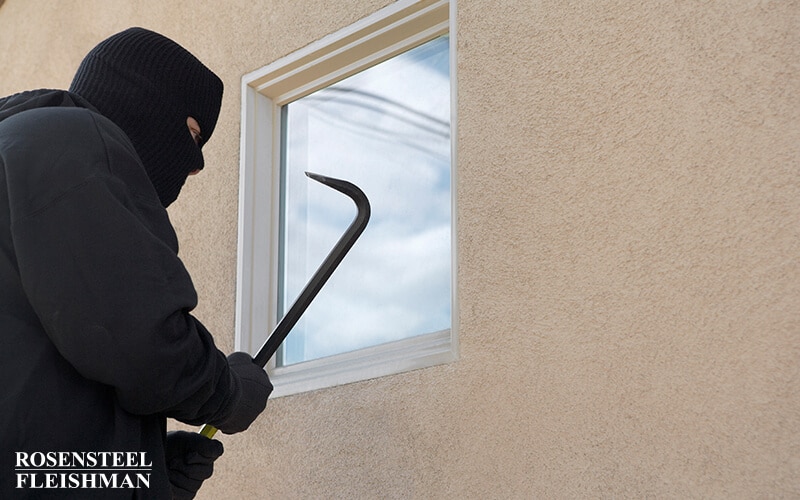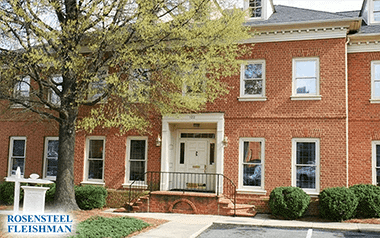Criminal Defense Lawyer for Breaking or Entering Charges

North Carolina law includes a range of breaking or entering offenses, from misdemeanors to serious felonies. If you’ve been charged with one of these offenses, having an experienced defense attorney by your side is essential to navigating the legal process and exploring the most effective course of action. Call Mr. Rosensteel today to get started on your defense without delay.
North Carolina Felony Breaking or Entering Definition
A person who commits felony breaking or entering is guilty of a Class H felony. North Carolina law provides that a person who commits a Class H felony must receive a sentence between 4 and 25 months, depending on the person’s prior convictions.
A person with no prior convictions may receive a community or intermediate punishment, but the court is permitted to sentence any person convicted of a Class H felony to active jail time.
A person commits felony breaking or entering when he “breaks or enters any building with intent to commit any felony or larceny therein.” To prove that a person is guilty of felony breaking or entering, the following elements must be shown:
- there was a breaking or entering by the defendant
- it was a building that was broken into or entered
- the owner or tenant, did not consent to the breaking or entering
- at the time of breaking or entering, the defendant intended to commit a felony or larceny
Misdemeanor Breaking or Entering
A person commits misdemeanor breaking or entering when he “wrongfully breaks or enters any building.” To prove that a person is guilty of misdemeanor breaking or entering, the following elements must be shown:
- there was a breaking or entering by the defendant
- it was a building that was broken into or entered
- the owner or tenant, did not consent to the breaking or entering
- at the time of the breaking or entering, the defendant acted wrongfully, that is, without any claim of right
A person who commits misdemeanor breaking or entering is guilty of a Class 1 misdemeanor. North Carolina statute provides that a person who commits a Class 1 misdemeanor receives a sentence between 1 day and 120 days, depending on their prior convictions. A person with no prior convictions cannot receive more than a 45-day sentence, and this sentence must be community punishment. However, it is possible for a person with one or more prior convictions to receive active jail time as a punishment.
Breaking or Entering with Intent to Terrorize
When a person “breaks or enters any building with intent to terrorize or injure an occupant of the building” he is also guilty of a Class H felony. The language making it a felony to break or enter any building with the intent to terrorize or injure an occupant is relatively new and was added in 2013. One of the congressman involved in passing the law explained that it is aimed at domestic violence situations, though there is no requirement that the defendant and the victim have a relationship.
There is not much explanation yet as to what an “intent to terrorize” means in this context, but the purpose of terrorizing has been explored in kidnapping situations. In those cases, North Carolina courts have explained that
Terrorizing is defined as more than just putting another in fear. It means putting that person in some high degree of fear, a state of intense fright or apprehension. … [T]he test is not whether subjectively the victim was in fact terrorized, but whether the evidence supports a finding that the defendant’s purpose was to terrorize the victim. However, the victim’s subjective feelings of fear, while not determinative of the defendant’s intent to terrorize, are relevant. The presence or absence of the defendant’s intent or purpose to terrorize … may be inferred by the fact-finder from the circumstances surrounding the events constituting the alleged crime.
Building
The term “building” is defined by the breaking or entering statute as including “any dwelling, dwelling house, uninhabited house, building under construction, building within the curtilage of a dwelling house, and any other structure designed to house or secure within it any activity or property.”
Breaking or Entering a Place of Religious Worship
North Carolina statute provides that it is a more serious offense to break or enter into a building that is a place of religious worship. The statute defines a building that is a place of religious worship as including “any church, chapel, meetinghouse, synagogue, temple, longhouse, or mosque, or other building that is regularly used, and clearly identifiable, as a place for religious worship.”
A person who commits breaking or entering a place of religious worship is guilty of a Class G felony. North Carolina law provides that a person who commits a Class G felony must receive a sentence between 8 and 31 months, depending on the person’s prior convictions. A person with no prior convictions may receive an intermediate punishment, but the court is permitted to sentence any person convicted of a Class G felony to active jail time.
Breaking or Entering a Motor Vehicle
It is a felony to break or enter a motor vehicle with the intent to commit a felony or larceny therein. To show that a person is guilty of breaking or entering a motor vehicle, the following elements must be proven:
- there was a breaking or an entry by the defendant
- it was a motor vehicle which was broken into or entered
- there was something of value in the motor vehicle
- the owner did not consent to the breaking or entering
- at the time of the breaking or entering, the defendant intended to commit larceny therein
The statute further states that “[i]t is prima facie evidence that a person entered in violation of this section if he is found unlawfully in such… motor vehicle.”
A person who commits breaking or entering a motor vehicle is guilty of a Class I felony. North Carolina law provides that a person who commits a Class I felony must receive a sentence between 3 and 12 months, depending on the person’s prior convictions. A person with no prior convictions must receive a community punishment, but the court is permitted to sentence a person with prior convictions to active jail time.
Preparations to Commit Breaking or Entering
North Carolina law makes it a crime to possess certain tools used to break into buildings such as “any picklock, key, bit or other implement of housebreaking.” A person may possess such items if he has a lawful excuse for the possession. One such lawful excuse would be use in a person’s trade or business.
It is also a crime to possess, with the intent to commit a felony or larceny, a “master key” or “manipulative key” used to break into motor vehicles. A “master key” is defined as “a key that operates all the keyed locks or cylinders in a similar type or group of locks.” A “manipulative key” is defined as “a key, device or instrument, other than a key that is designed to operate a specific lock, that can be variably positioned and manipulated in a vehicle keyway to operate a lock or cylinder or multiple locks or cylinders, including a wiggle key, jiggle key, or rocket key.”
A person who possesses “implements of housebreaking” without a lawful excuse is guilty of a Class I felony. A person who possesses a “master key” or “manipulative key” with the intent to commit a felony or larceny commits a Class 1 misdemeanor for the first offense and a Class I felony for a second or subsequent violation.
Speak to a Charlotte, NC Lawyer about your Breaking or Entering Case Today
Being charged with a breaking or entering offense can be a serious and life-altering event. The consequences of a conviction can include jail time, fines, and a criminal record that can affect your future job prospects, housing options, and more. That's why it's important to speak to an experienced criminal defense attorney as soon as possible.
At Rosensteel Fleishman Car Accident & Injury Lawyers, our lawyers have extensive experience representing clients charged with breaking and entering offenses. We understand the complex legal issues involved in these cases and we have the knowledge and skills necessary to build a strong defense on your behalf.
Whether you are facing charges for residential breaking and entering, commercial breaking and entering, or any other type of breaking and entering offense, our attorneys are ready to help. We will take the time to review the facts of your case and advise you of your rights and options.
If you have been charged with a breaking and entering offense, don't wait to take action. Contact Rosensteel Fleishman Car Accident & Injury Lawyers today at (704) 714-1450 to schedule a free initial consultation. Our experienced criminal defense attorneys are here to help you understand your rights and options, and to build a strong defense on your behalf.

